January 2025
The global cloud sustainability market size accounted for USD 30.28 billion in 2024, grew to USD 36.11 billion in 2025 and is expected to be worth around USD 175.82 billion by 2034, registering a healthy CAGR of 19.23% between 2024 and 2034. The North America cloud sustainability market size is calculated at USD 11.20 billion in 2024 and is expected to grow at a CAGR of 19.37% during the forecast year.
The global cloud sustainability market size is calculated at USD 30.28 billion in 2024 and is predicted to reach around USD 175.82 billion by 2034, expanding at a CAGR of 19.23% from 2024 to 2034. The cloud sustainability market growth is attributed to the increasing demand for energy-efficient solutions, driven by regulatory pressures and a rising consumer awareness of sustainability practices.
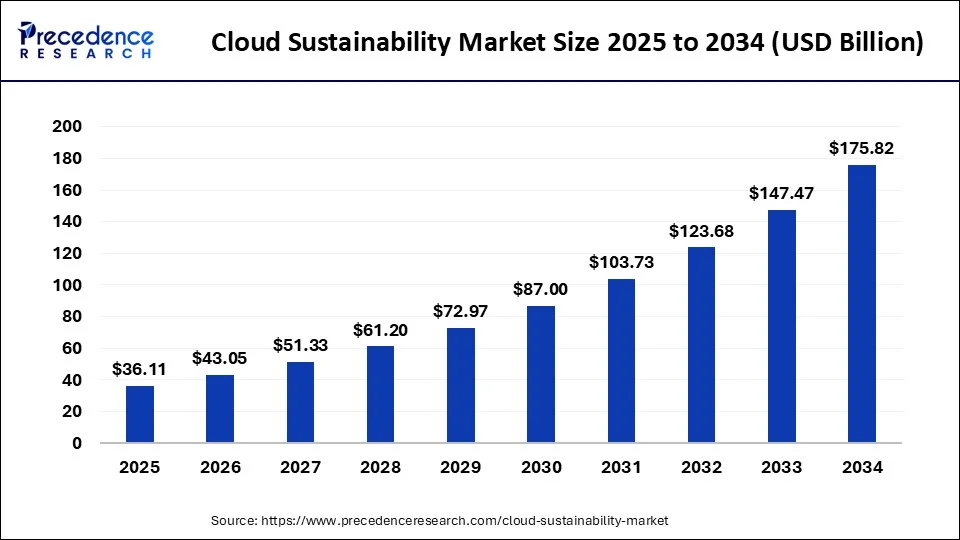
The U.S. cloud sustainability market size is exhibited at USD 7.84 billion in 2024 and is projected to be worth around USD 46.48 billion by 2034, growing at a CAGR of 19.44% from 2024 to 2034.
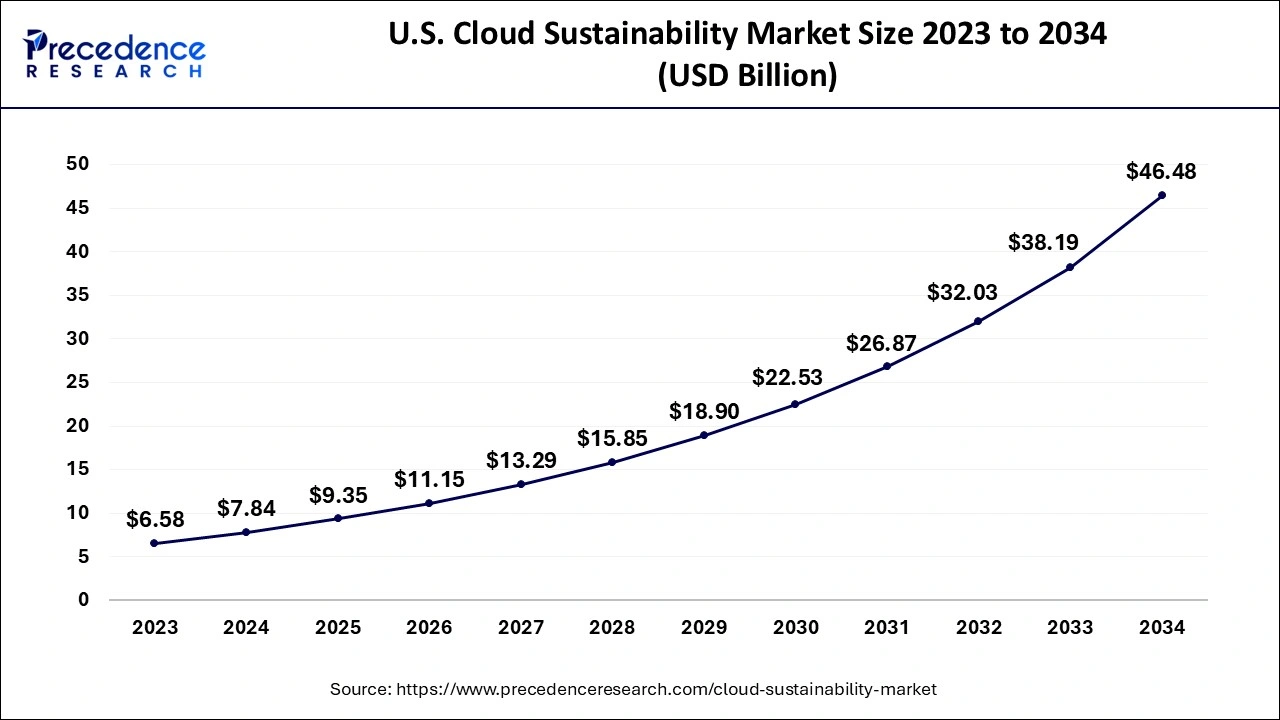
North America dominated the cloud sustainability market during the forecast period due to the technological giants and the higher diffusion of cloud services across sectors. Governments and companies in the United States and Canada rely on cloud infrastructure to support better performance and enhance sustainable development goals. Moreover, the region's supportive legal environment plus government policies, such as carbon credits, which pressure enterprises into embracing green processes, further facilitate demand for cloud sustainability.
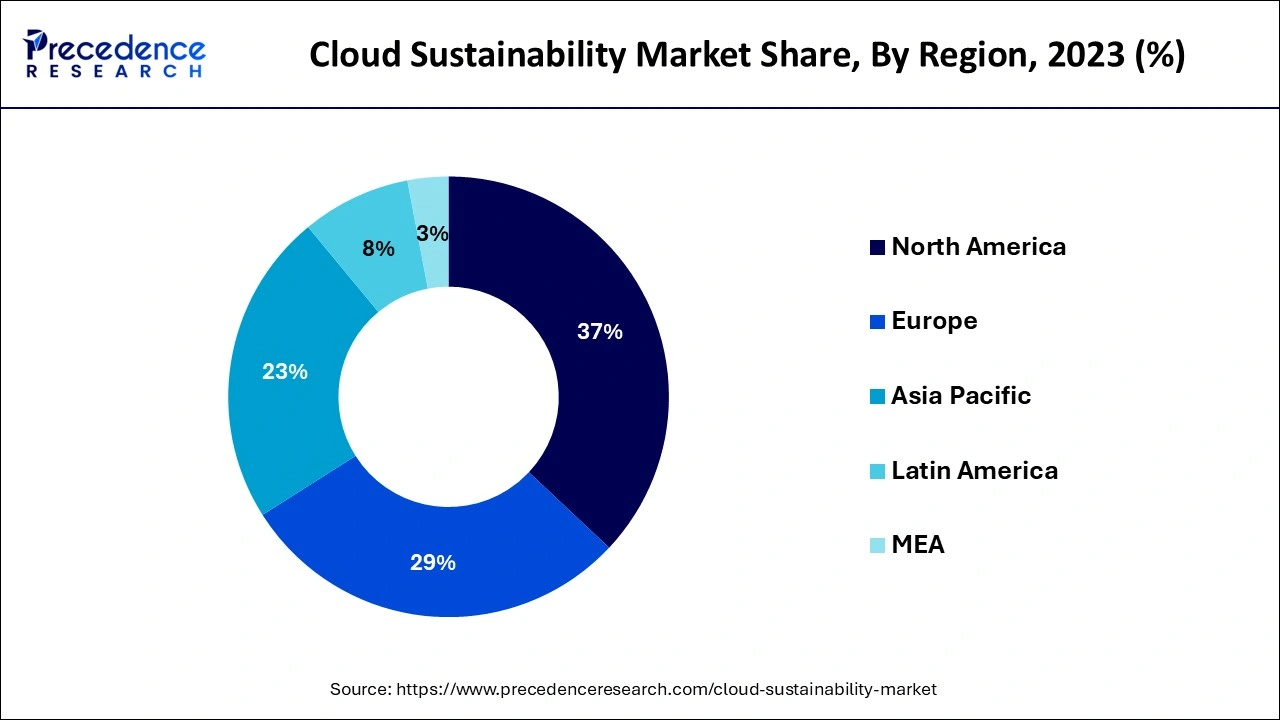
Asia Pacific is projected to host the fastest-growing cloud sustainability market in the coming years owing to increased industrialization and urbanization. Countries such as China and India are consuming large amounts of energy productivity; this has led to a call for organizing and a sustainable manner. Additionally, political activity in the countries of the region expands the regulations that prescribe the utilization of cloud solutions that increase energy efficiency and the rational use of resources.
As organizations adapt to sustainable computing, growing demands for energy-efficient and sustainable solutions are expected to fuel the market. A technology that aims at the conservation of energy in the cloud system, as it reduces the use of energy from the power grid and also reduces the environmental effects since it uses renewable energy and efficient methods of data handling.
Cloud sustainability encompasses incorporating green data centers, energy management software, and carbon reduction measures to enable organizations to achieve sustainable goals and meet laid-down environmental standards. Furthermore, cloud sustainability tech features high scalability, which means that organizations can deploy sustainable technology to track the impact on the environment and control expenses that result from unruly electricity consumption.
Impact of Artificial Intelligence (AI) on the Cloud Sustainability Market
Artificial Intelligence (AI) contributes to strengthening the market for the sustainability of the cloud by efficient regulation of energy consumption and minimizing the negative impact on the environment. Both new and mature companies tap into artificial intelligence to redefine disruptive strategies in the strongly growing market environment. AI technologies keep on developing and reforming the current industries and creating new industries to open up a new potential market and transform business systems worldwide. Moreover, sustainable and responsible reorganization is influenced by ethical considerations facilitating the demand for stringent rules governing the development of AI.
| Report Coverage | Details |
| Market Size by 2034 | USD 175.82 Billion |
| Market Size in 2024 | USD 30.28 Billion |
| Market Size in 2025 | USD 36.11 Billion |
| Market Growth Rate from 2024 to 2034 | CAGR of 19.23% |
| Largest Market | North America |
| Base Year | 2023 |
| Forecast Period | 2024 to 2034 |
| Segments Covered | Solution, Enterprise Size, Service Model, End-user, and Regions |
| Regions Covered | North America, Europe, Asia-Pacific, Latin America and Middle East, & Africa |
Growing demand for energy efficiency solutions
Growing demand for energy efficiency technology solutions is anticipated to drive the market in the coming years. Businesses are focusing on increasing their efficiency while reducing their power consumption. Businesses looking for methods to cut their resource usage and cost of operations find it beneficial to use cloud services to monitor and curtail energy usage. Those organizations level up their power utilization by analyzing the results of AI executing analytics and data to track overall power usage and energy requirements and minimize excess use.
Green cloud solutions promote environmental conservation and have a social responsibility to corporate organizations and governments in achieving goals set in emission controls. Additionally, the modern trend of environmentally responsible business practices makes energy-efficient clouds a major part of sustainable business infrastructure.
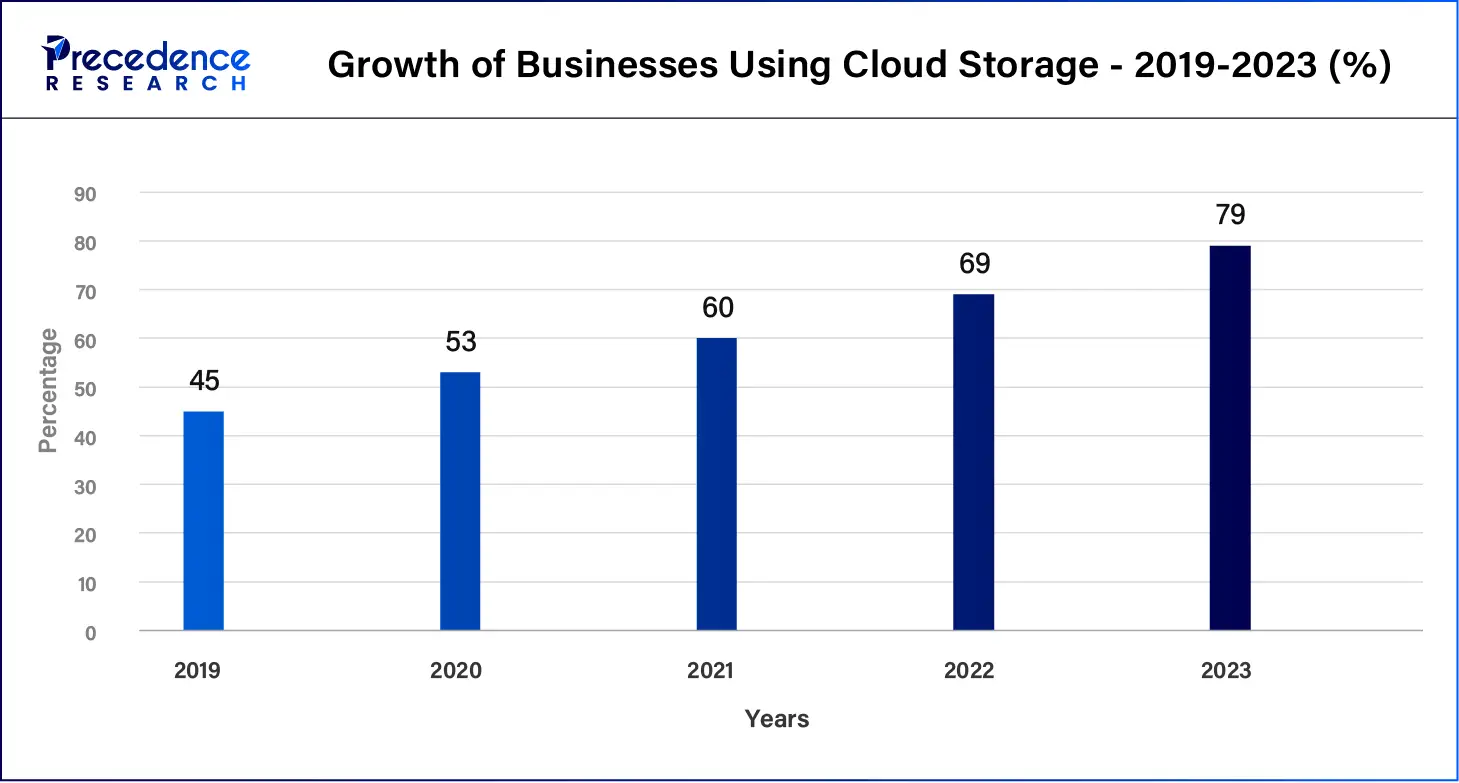
Regulatory challenges
Regulatory challenges impede the widespread adoption of sustainable cloud practices, thus further hindering the market. Growing regulations that differ from one region to another make it challenging to undertake cloud sustainability measures. A diverse set of rules and regulations for implementing data handling, energy requirements, and impact assessment makes it challenging for organizations to comprehend them.
The EU has established the General Data Protection Regulation (GDPR), which sets strict rules that limit the way that firms handle data within cloud computing space. Such regulatory environs are poised to foster indecision in regard to the shift to cloud sustainability.
Investment in renewable energy technologies
Growing investment in renewable energy technologies presents an immense opportunity for the players competing in the cloud sustainability market. Businesses increasingly commit to integrating renewable energy sources, such as solar and wind, into their operations. This increasing renewable energy increases the demand for cloud solutions that promote efficient energy use to enhance the carbon credits for any business.
The drive towards renewable energy is an opportunity within a market and also pushes for cloud service providers and energy companies to look for better methods of working together while trying to come up with new and sustainable solutions. Additionally, efforts, such as the United Nations Sustainable Development Goals (SDGs), envisage providing affordable, reliable, sustainable, modern energy for all by 2030, making the rollout of these clouds crucial.
The energy-efficient infrastructure segment held a dominant presence in the cloud sustainability market in 2023 due to the increased need for organizations to reduce their environmental impacts while raising operational performance. Furthermore, the proactive approach makes energy-efficient infrastructure.
The green software solutions segment is expected to grow at the fastest rate in the cloud sustainability market during the forecast period of 2024 to 2034, as different organizations are convicted of needing sustainable software development strategies. Moreover, industries with active participation in green software strategies are expected to create immense opportunities for the segment.
The large enterprises segment accounted for a considerable share of the cloud sustainability market in 2023, owing to their large reserves and the intensity with which they practice sustainable practices. In 2024, these organizations are likely to engage in massive investments in clouds that improve energy management and overall sustainable programs. Furthermore, large firms are actively adopting sustainable practices to minimize carbon emissions, which further fuels the demand for sustainability solutions in these sectors.
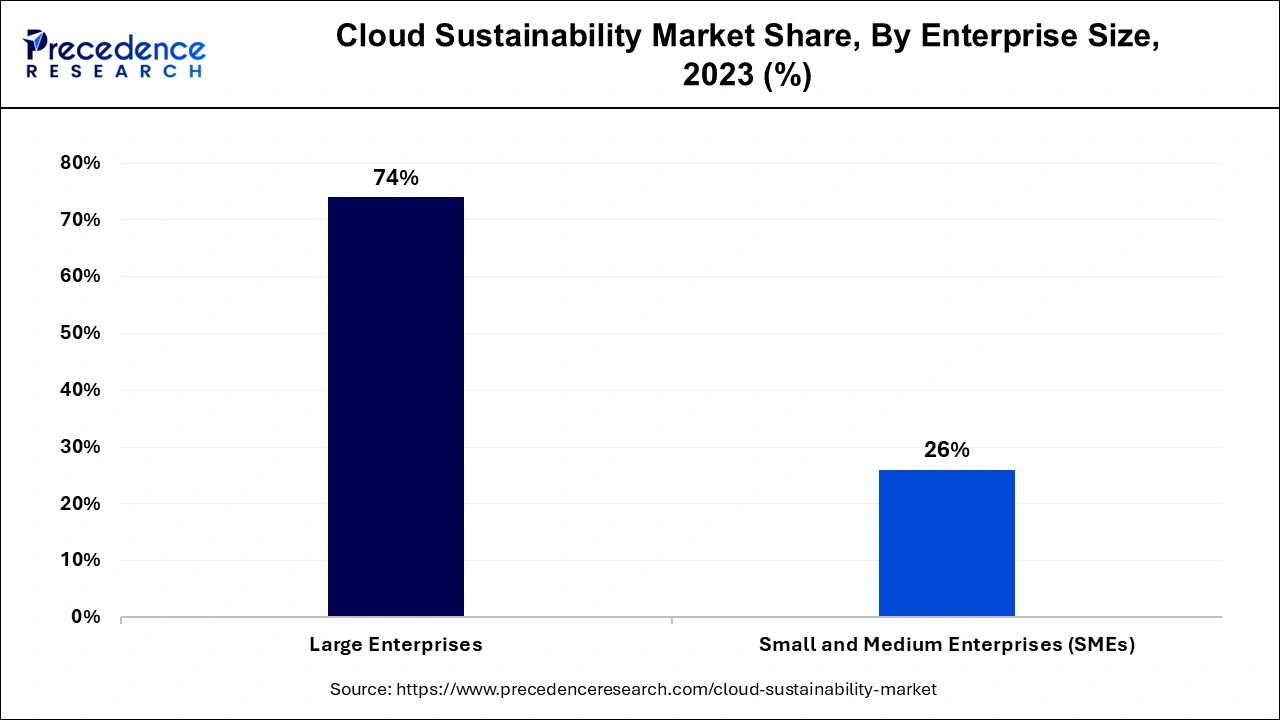
The small & medium enterprises (SMEs) segment is anticipated to grow with the highest CAGR in the cloud sustainability market during the studied years during the forecasting period, as they are innovative in adopting new technology adoptions, and there is increasing concern for sustainability practices. Additionally, the shift towards remote work and increased digitalization resulted in these enterprises adopting cloud solutions that improve business operations and save energy.
The infrastructures as a service segment led the global cloud sustainability market due to the ability to implement ideal practices in a vast area and at various levels. IaaS optimizes the management of an organization’s IT systems and the conservation of energy. This service model helps enterprises harness on-demand computing, storage capacities, and networks. They are able to reduce expenditures related to energy and hardware maintenance.
The green data centers segment is projected to expand rapidly in the cloud sustainability market in the coming years, owing to the growing consciousness of the environment and the high costs that organizations incur when adopting energy efficiency measures. These facilities adopt sophisticated energy conservation and CO2 emission control technologies for efficiency. Furthermore, the growth in consumption of cloud services is likely to create the need to establish eco-friendly data centers as firms try to embrace eco-friendly measures. This increasing trend toward greenness triggers the impact of green data centers being an integral part of cloud services transformation incremental towards sustainable goals.
The IT & telecom segment dominated the global cloud sustainability market in 2023 during the forecasting period due to the sector's technological evolution and the growth of cloud usage throughout the processes essential for the actors. Major organizations in this industry are embarking on aggressive cloud infrastructure investments to improve services and capacity. Additionally, there is an increase in focus on regulatory compliance and sustainability-related efforts.
The manufacturing segment is projected to grow at the fastest rate in the cloud sustainability market in the future years, owing to the continued need to make the current manufacturing processes energy-efficient and sustainable. The adoption of cloud-based services helps the sector address acute issues of data processing and resource management that are imperative in minimizing wastage. The manufacturers who adopt cloud technologies have gained the advantage of at least a 30% decrease in energy consumption due to improvement in efficiency. Additionally, the growing need for cloud services in various manufacturing sectors, including automobiles, will further boost the market in the coming years.
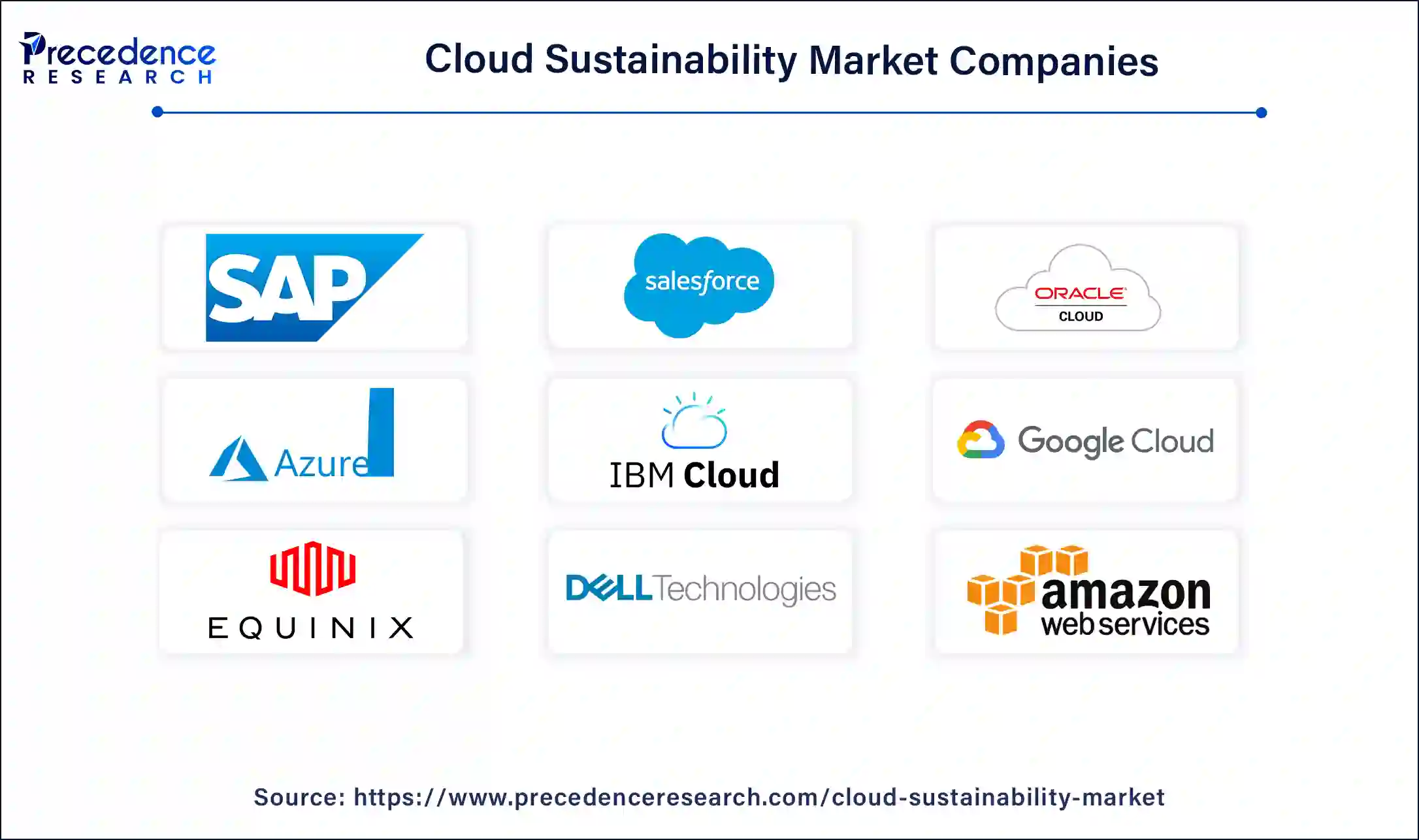
By Solution
By Enterprise Size
By Service Model
By End-user
By Geography
For inquiries regarding discounts, bulk purchases, or customization requests, please contact us at sales@precedenceresearch.com
No cookie-cutter, only authentic analysis – take the 1st step to become a Precedence Research client
January 2025
January 2025
January 2025
January 2025